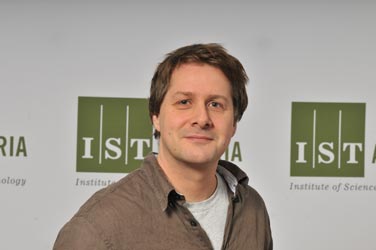October 1, 2013
Michael Sixt promoted to Professor at IST Austria
First IST Austria Assistant Professor to be promoted to Professor • Tenure evaluation committee recommends promotion of cell biologist • Henzinger highlights Sixt’s qualities as researcher and as contributor to the development of the Institute

As of October 1, 2013, Michael Sixt will be promoted to Professor at IST Austria. This is the result of the tenure evaluation which took place in summer 2013. The cell biologist is the first Assistant Professor at IST Austria to have undergone this procedure, which is compulsory according to the Institute’s performance-oriented career model for scientists – the tenure-track model.
President Thomas Henzinger congratulated Sixt on this result: “Michael was one of our first professors. He has proven to be an excellent scientist and an outstanding group leader, expanding the frontiers of his field of research and contributing to the development of the Institute.”
The tenure evaluation process is an essential part of IST Austria’s tenure track model, which follows international standards. Promising young scientists are offered positions as independent group leaders, so-called Assistant Professors, for a period of up to seven years. At the end of this period the Professorial Committee of IST Austria collects confidential reviews of the Assistant Professor’s scientific accomplishments from independent international experts. After consulting the external reviews, the committee decides on the promotion from Assistant Professor with a temporary contract, to tenured Professor with an unlimited contract. The decision of the committee is based primarily on the research achievements of the scientist, plus the training, supervision and mentoring of PhD students and postdocs as well as service to the Institute and the scientific community. The Professorial Committee of IST Austria is chaired by Olaf Kuebler from ETH Zurich.
Michael Sixt aims to understand the molecular and mechanical principles of cell motility at both the cellular and tissue level. Currently, he uses leukocyte migration as a model for studying how the cell’s internal skeleton produces force to deform the cell, and how this force is transmitted to the surrounding tissue to propel the cell forward. This research should not only provide information regarding cell motility in immune cells, but may aid in the understanding of migration by other cell types, including malignant cancer cells. Michael Sixt studied medicine at the Friedrich-Alexander University of Erlangen-Nürnberg, where he performed his pre-doctoral studies at the Institute of Experimental Medicine and finished his MD in 2002. Before he joined IST Austria in 2010 Sixt was Junior Group Leader and Endowed Professor of the Peter Hans Hofschneider Foundation for Experimental Biomedicine at the Max Plank Institute of Biochemistry in Martinsried.
Sixt has been awarded an ERC Starting Grant and the START prize by the Austrian Science Fund FWF both in 2011, a grant by the Human Frontier Science Program and the Ignaz L. Lieben-Prize of the Austrian Academy of Sciences (ÖAW), both in 2012, and was elected member of the “Junge Kurie” (Young Academy) of the ÖAW in 2013. 2013 he received the Young Investigators Medal of the European Biophysical Societies’ Association.
The tenure evaluations of the other Assistant Professors will follow in due course. Henzinger concludes: “IST Austria’s tenure track model offers promising young researchers full independence at an early stage of their career. This model is challenging and selective. But it offers Assistant Professors the perspective of a tenured professorship if they meet the Institute’s scientific standard of excellence. This model allows IST Austria to compete with the leading institutions in the world for scientific talent.”



